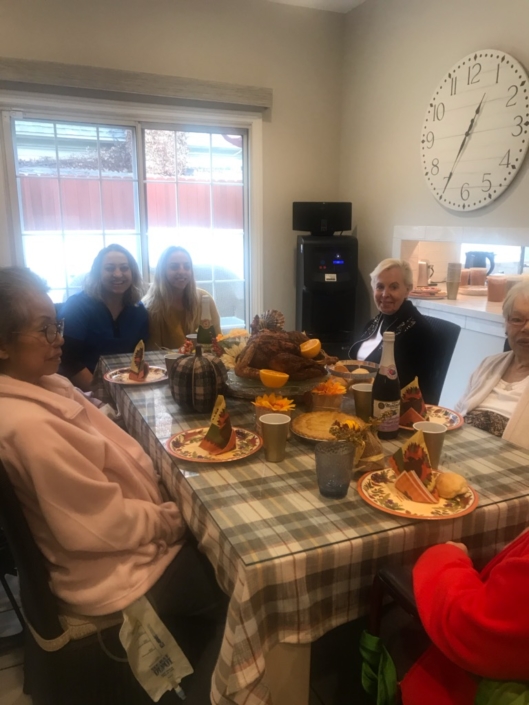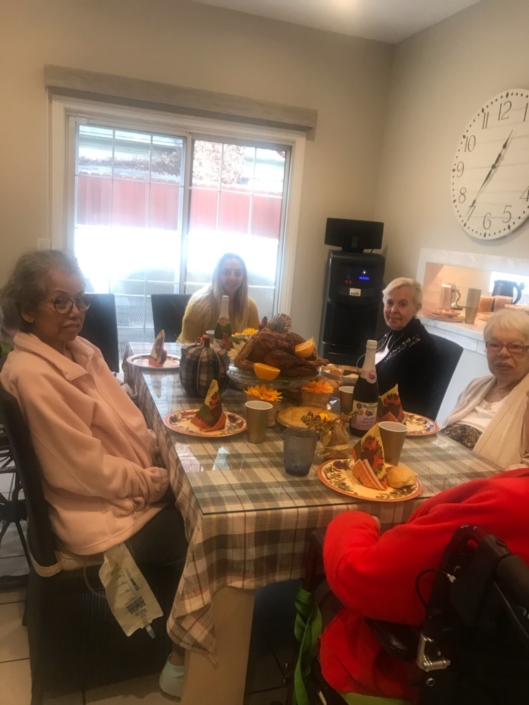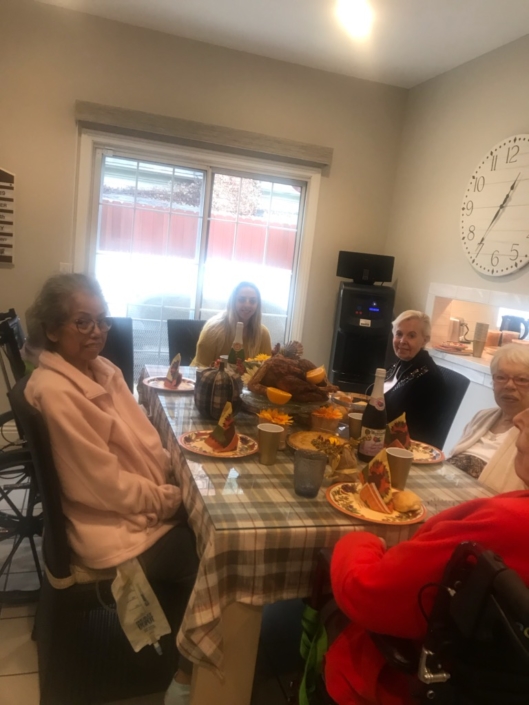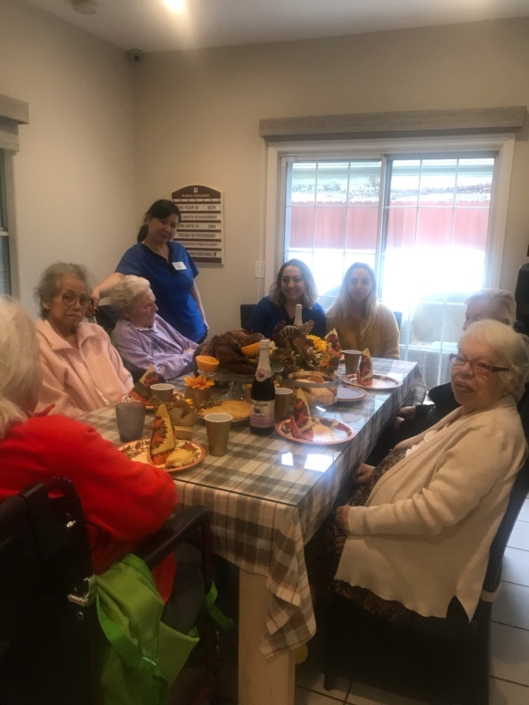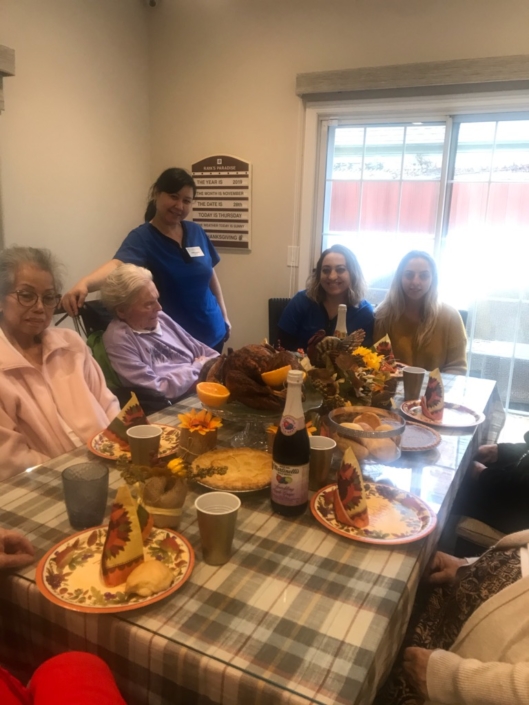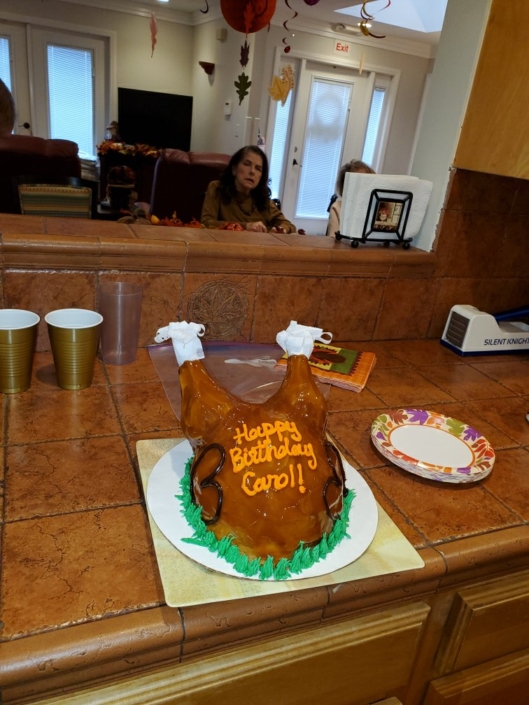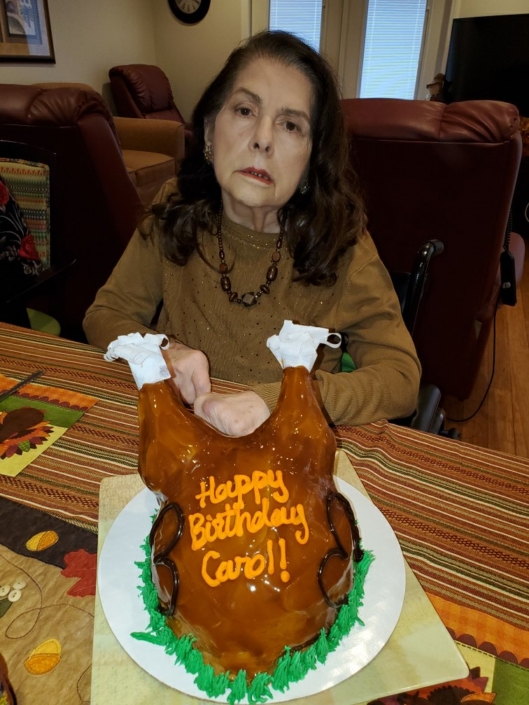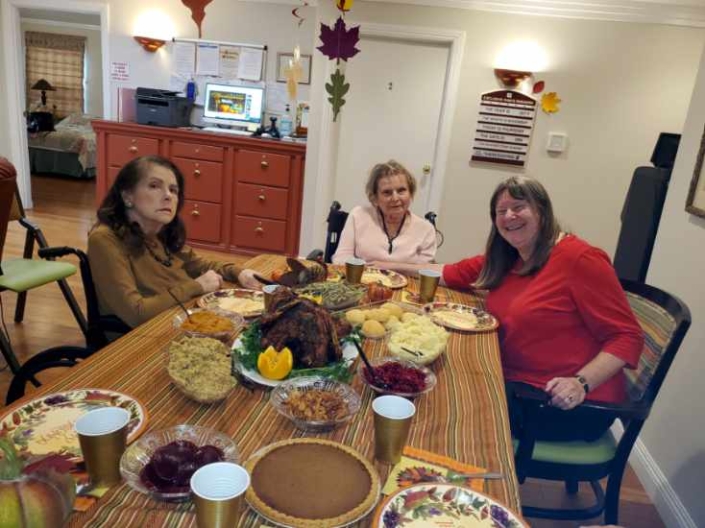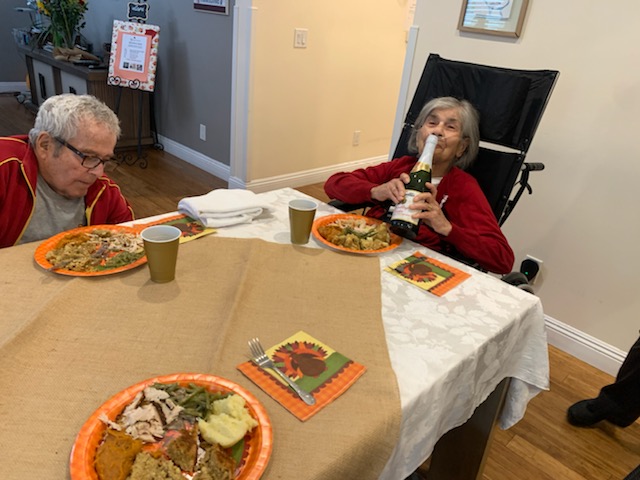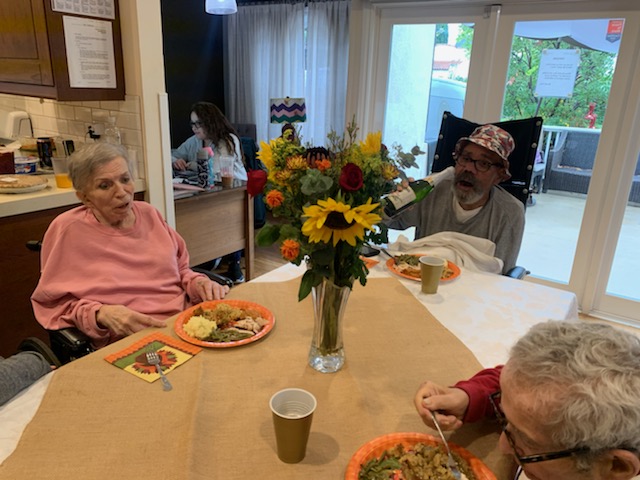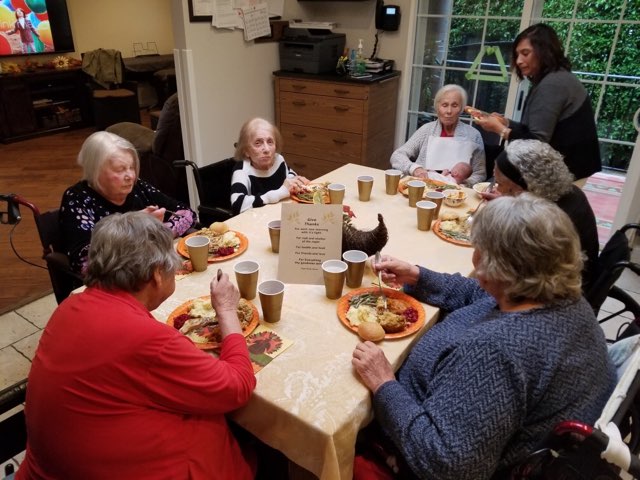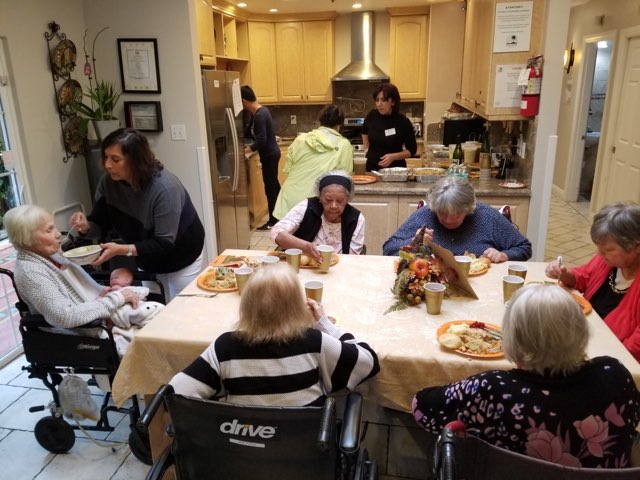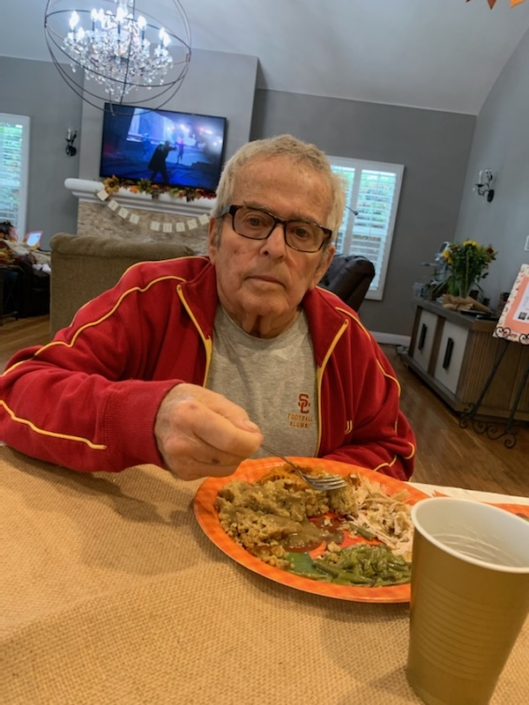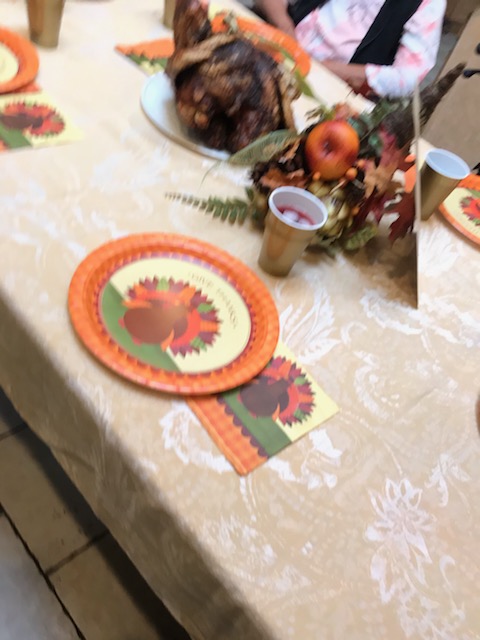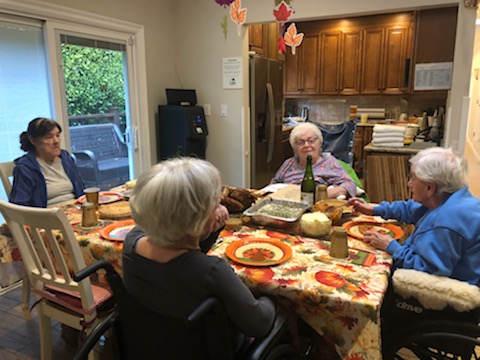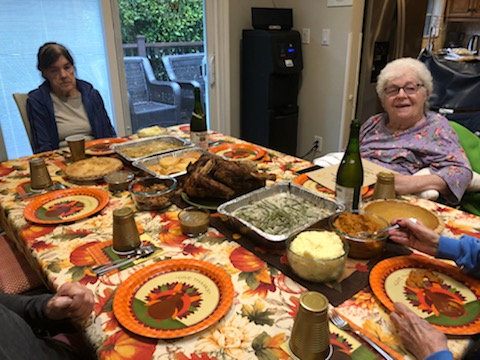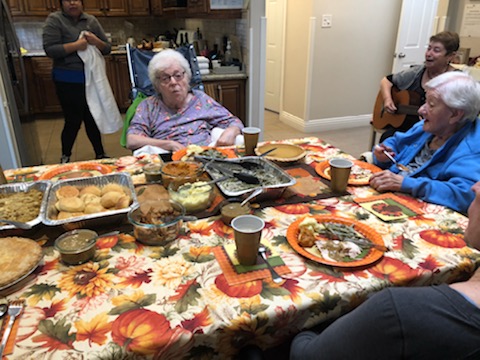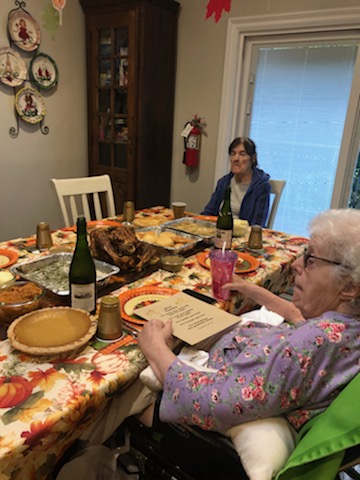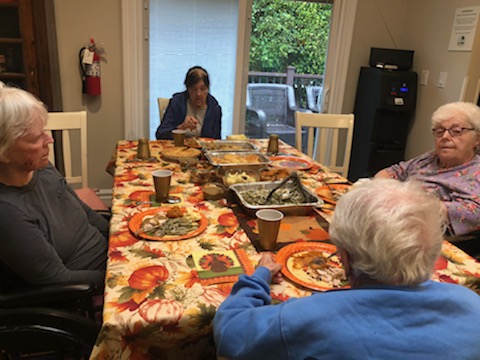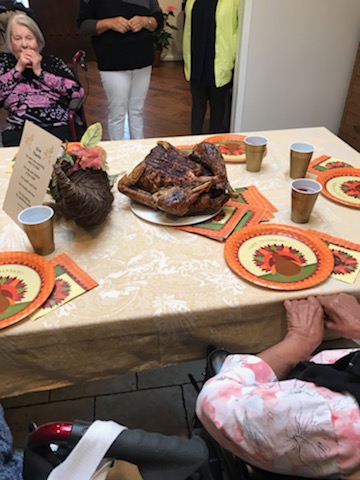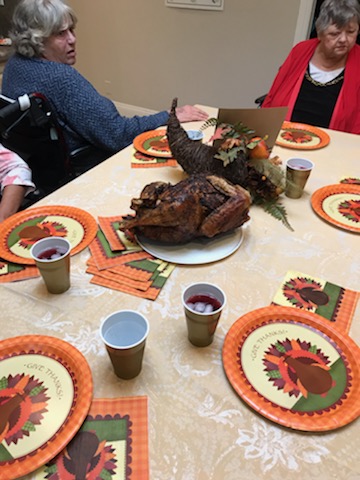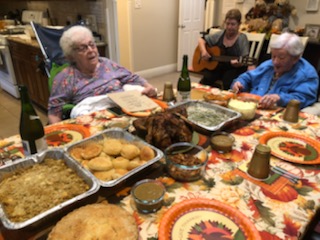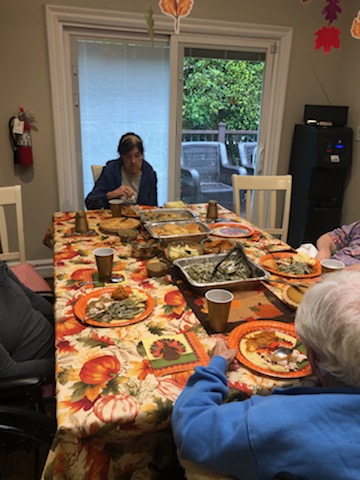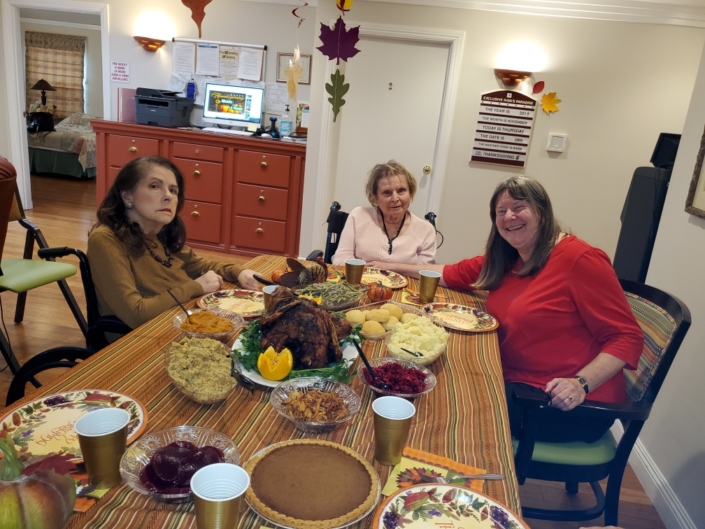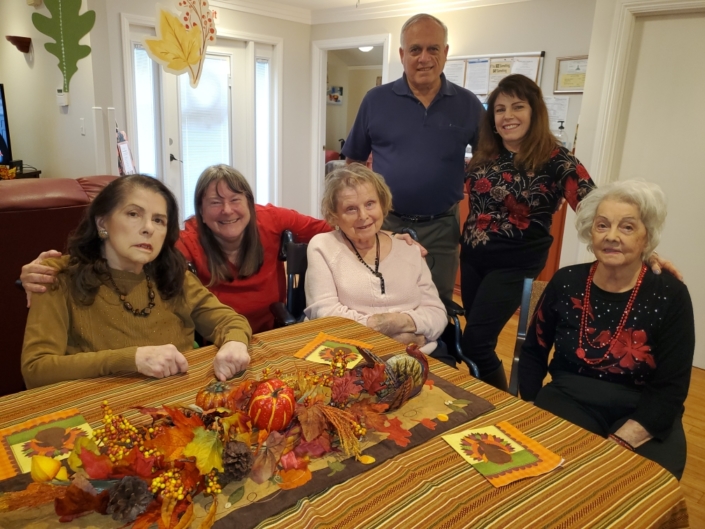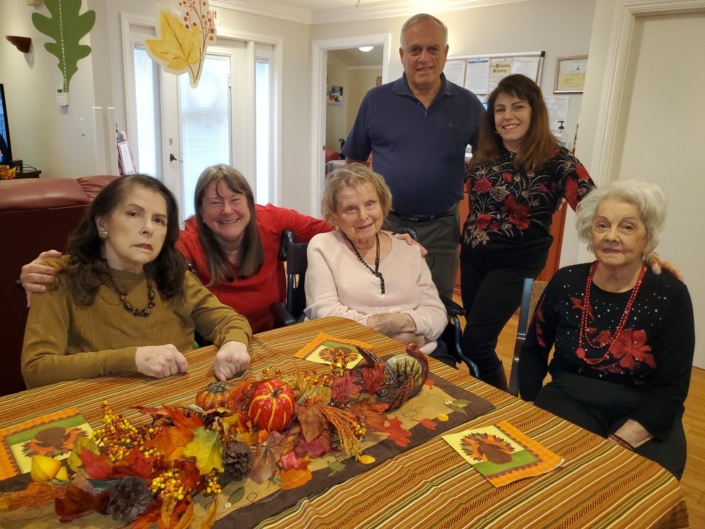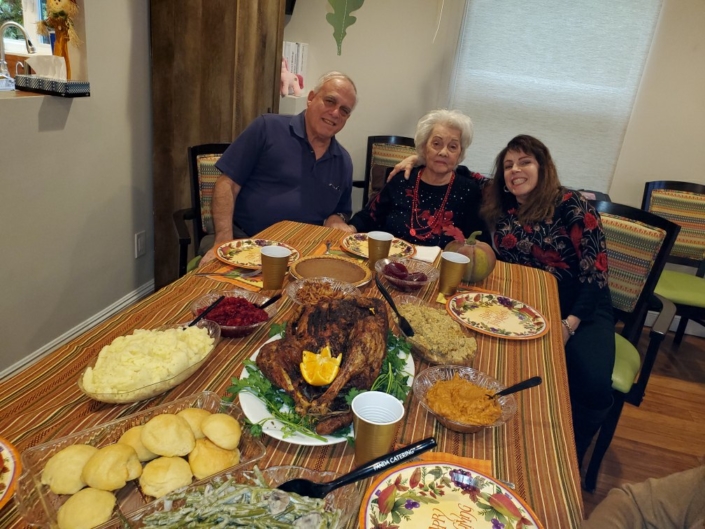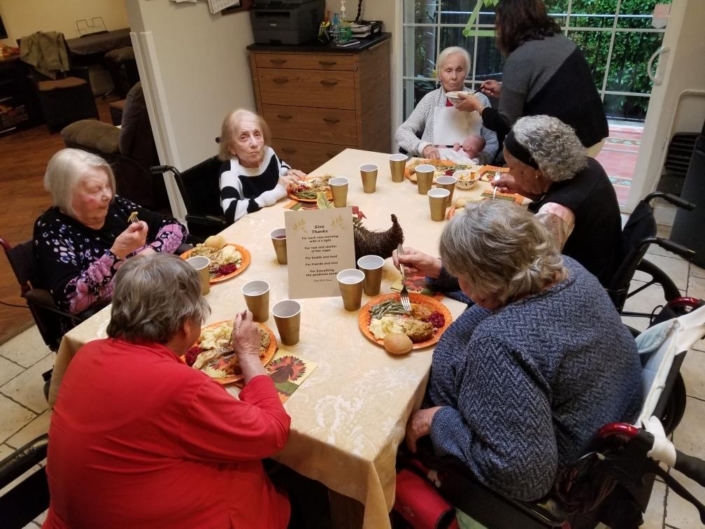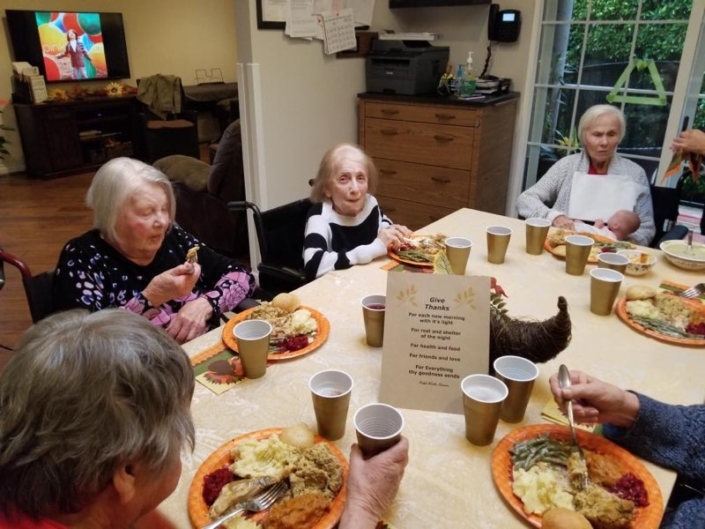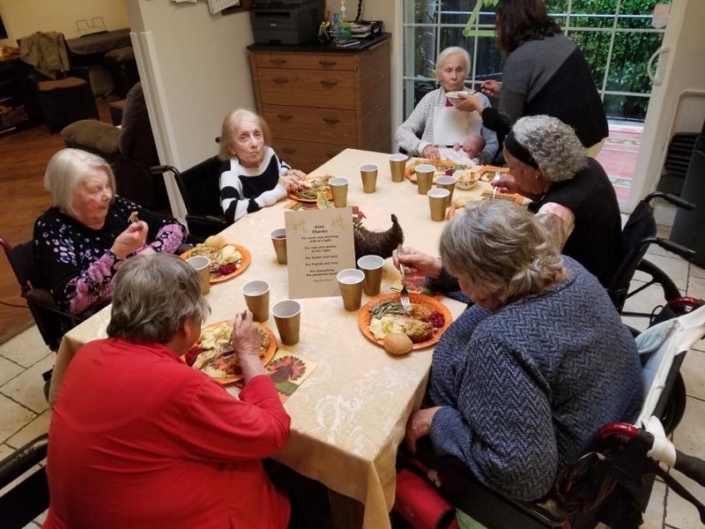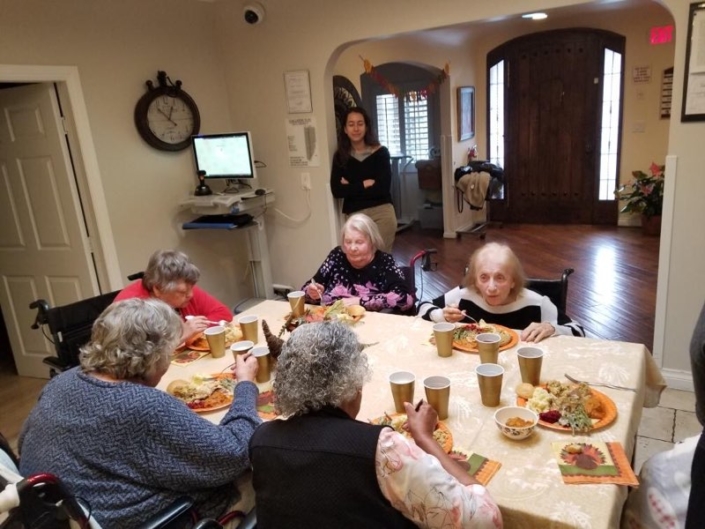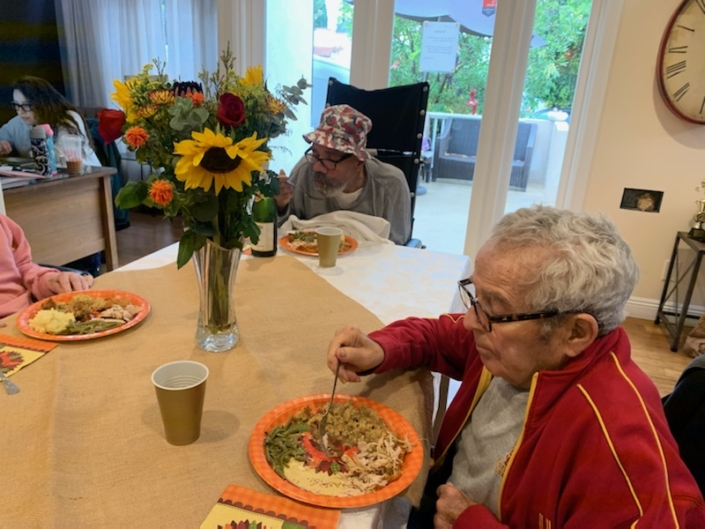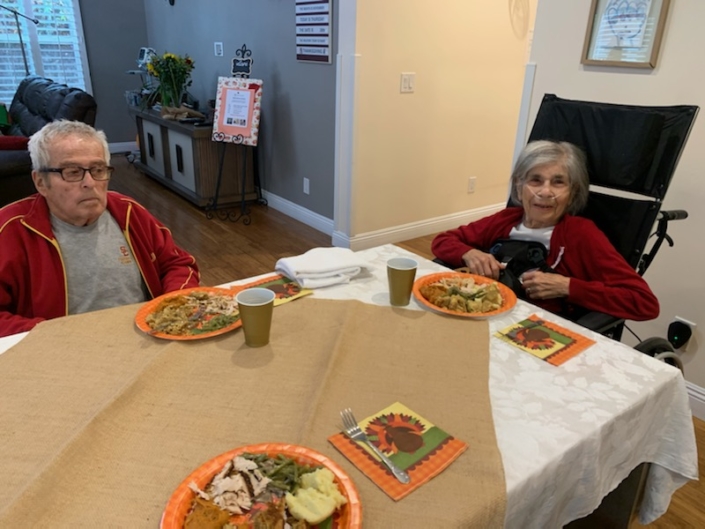Our Caregivers & Residents enjoyed a spectacular Thanksgiving celebration this year with Turkey and all the fixins.
/by Raya's ParadiseThe biggest travel day of the year, the day before Thanksgiving, is almost here. For families with an aging loved one, that brings up the question of how to get that person to the feast. Whether travel means just a few hours by car or a plane ride, here are some tips for making sure your voyage goes as smoothly as possible.
1. Talk to your loved one’s doctor. Make sure that it’s OK for them to travel before you take off, and that the place where you’re headed is somewhere they can handle. Your doctor will let you know if there’s any special preparations you need to make in advance, and can also give you advice on medication to take if problems with anxiety or other issues arise. Make sure that you fill your loved one’s prescriptions before you go.
2. Do some advance planning. Think through your trip with your loved one’s limitations in mind. Are you renting a car? Then make sure you’ve requested a minivan or other vehicle that will be easy for them to get into and out of. Make sure you can fit their wheelchair and any other bulky equipment. If you’re flying, put in a request for seats meant for the disabled and notify the airline of any dietary restrictions. Also request a wheelchair so that you have some help navigating the airport. Contact both your hotel and airline to make sure they are able to handle any medical equipment that your loved one needs. Request a hotel room at ground level.
3. Be realistic. You may need to scale down on your usual travel routine. Keep things simple. For example, consider renting a cabin in the woods that’s just a two-hour drive away, rather than going to Europe or planning anything that will require a lot of walking (such as visiting an amusement park). Do your research in advance to make sure the location is properly equipped to have your loved one as a guest. Put plenty of padding in your schedule and don’t overload on the activities: it will likely take much more time to do things than normal.
4. Make sure you have necessary supplies. Special stockings can help if your loved one will be sitting for long periods, so that their extremities don’t go numb or a blood clot forms. Make sure you have protective gear for the sun, and especially that you have enough water since seniors are more susceptible to dehydration. Make sure medical information is with you at all times in case there’s an emergency.
/by Moti GamburdIt’s well known that having friends boosts your wellbeing. In fact, today’s research has even shown that having numerous friends reduces the risk of medical conditions like heart disease. “Stereotypes of aging tend to paint older adults in many cultures as sad and lonely,” says lead author Dr. Wändi Bruine de Bruin in a release by the Americans Psychological Association. Recent studies have also demonstrated the continued importance of friendship and positive relationship networks for assisted living residents without cognitive impairment and for residents with mild cognitive impairment (MCI) and dementia.
Engagement Coordinator for Raya’s Paradise, Elsa Argueta added, “my goal is to encourage and create opportunities for our residents to make new personal connections. Through programs designed based on our residents’ hobbies and interests, I have found that seniors begin to gravitate to those with shared interests. This way they are able to keep up the social interactions that keep them mentally, emotionally, and physically healthy.
At Raya’s Paradise, we are aware that making friends in a new place can be a challenge. Elsa added, “because of this, we create events for new residents that allow for connections. These connections result in a feeling of community and family.” As a best practice, Elsa recommended that though a new residents may be somewhat anxious, tired, or overwhelmed by a move, “it is a great start to attend outing and activities as they act as a good way to strike up conversations, ask questions, and find out what upcoming programs and special events there are to look forward to.”
/by Raya's ParadiseAt the final stage, Alzheimer’s disease begins to affect a person’s physical as well as their mental capacity. At this point, the person will require intensive, round-the-clock caregiving: assistance with dressing, eating, using the bathroom, and other ordinary tasks. The goal at this point is to make sure your loved one is comfortable and that they maintain as much dignity as possible.
At this stage, communication becomes difficult, and the person loses the ability to have a conversation. They might need assistance in order to walk, and their muscles might become rigid or possess abnormal reflexes. As the disease progresses they will likely also become unable to control their bladder or to swallow. At this stage, it is important to watch for infections; there is an especially high chance of pneumonia.
Due to the extent of your loved one’s needs now, this is the time when you’re most likely to need to move the person to a facility where they can receive the proper care. This is a decision that will require lots of research and education to make sure you’re making the right choice. On this website, we have many different resources to help you find the right Alzheimer’s care solution.
Though they have trouble speaking, your loved one is still “there.” They feel emotions such as calmness, fear, and love. They can also still use their senses to perceive you and the world around them – this is their primary way of interacting. Your main focus will be on providing for their physical well-being, but try to find ways to connect with them. You might read to them, look at old photographs, play music they might like, give them some potpourri to smell, or make them a meal they would enjoy. Think about the basic life pleasures that many of us take for granted – these are the kind of things your loved one can take pleasure in at this point.
This stage of the disease is one that is difficult for caregivers, both on an emotional level and on a physical level too. As the end of your loved one’s life approaches, you might be feeling sad, relieved, or numb to any feeling at all. These reactions are all normal. Receiving guidance from a bereavement specialist, therapist, clergy member, or other support can help you address these feelings in a healthy way. It is important to confront your grief.
/by Moti GamburdFor seniors in delicate health, forgetting to take medication or taking it improperly can have more dire consequences than one might think. The federal government estimates that 10% of hospital admissions are due to taking medication incorrectly, and over 125,000 people die each year as a result of this problem. Almost a quarter of nursing home admissions might be due to seniors having trouble with taking their medication. Unfortunately, this is an alarmingly common problem, with over half of all seniors taking medication incorrectly. Half of those, in turn, make the kind of mistakes that could have serious ramifications! When we consider this information in light of the challenges of seniors with dementia, it’s clear that this is a problem caregivers and family members need to be alert about.
There are many devices and solutions available to help keep loved ones on track. One simple remedy is buying a pill dispenser or a similar device. Your local drug store probably carries basic versions that will both organize pills and sound some kind of alarm or another reminder. There are also more elaborate and expensive systems that might, for example, call a designated caregiver if the senior has missed a dose. There are even smartphone apps for this issue. Drug companies themselves are also trying to help, with phone calls to seniors who are taking their products.
However, studies have shown that these methods don’t solve the problem. Sometimes this is because the devices are too complicated for seniors to use, or because they are not equipped to handle the typical senior’s complex medication regimen. And these systems often require input from a senior who may no longer be organized or independent enough to do what’s needed. Even if a loved one sets up the system initially, snafus like dead batteries or a malfunction could cause that effort to be useless.
For this reason, the best solution is to have a family member or other caregiver help the seniors with managing their prescriptions. A human helper can also address when forgetfulness is not the issue so much as unwillingness or lack of understanding about why a particular medication is important. This can be a particular concern for dementia sufferers who are determined to hang on to control and demonstrate their independence. Ideally, there would be some kind of gadget or gizmo to make this problem go away, but this is one issue that requires a human touch.
/by Moti GamburdUntreated hearing loss has been linked to loneliness and isolation according to the Johns Hopkins’ Cochlear Center for Hearing and Public Health. Furthermore, it is thought that older adults with hearing loss attempt to utilize different parts of their brain to perceive sounds resulting in a larger demand from one’s working memory, leading to potential memory loss.
Upon thorough assessments, Raya’s Paradise customizes care plans to residents’ specific needs. Updated assessments and wellness checks facilitated by on staff nurses affords Raya’s Paradise to observe changes in hearing loss and potential for increased loneliness and isolation.
Raya’s Paradise combats loneliness by addressing changes in conditions through transportation to medical appointments to treat hearing loss, and 24/7 care to assist with hearing aid use. In most of our communities, you will also find intimate common living areas and gaming rooms for social activity. The dining rooms are shared and residents enjoy family style dining. We provide a calendar of structured social activities such as movie clubs, discussion groups and live entertainment. Our residents also have the option to choose to engage in off-site chauffeured trips escorted by community staff members: walks, shopping, movies and lunches.
Raya’s Paradise understands the toll loneliness and isolation can have on health and well-being; therefore, Raya’s Paradise communities makes an ongoing effort to get older adults involved in the community and come out of their shell.
/by Raya's ParadiseU.S. News & World Report recently released an article titled, “What’s the Best Age to Move into a Continuing Care Retirement Community“.
We couldn’t help but ask ourselves the same question: when’s the best age to move to a board and care community?
Older adults benefit from moving into a Board and Care sooner rather than later. Some older adults do not need as much assistance as they age. Raya’s Paradise Residential Care Communities cover the spectrum of senior housing options available. Residents are able to age in place without interrupting where they reside. Aging in place at Raya’s Paradise allows older adults to maintain friendships and continue receiving care from caregivers they know and trust.
Moving sooner supports the thought that growing old in a familiar environment supports the well-being of senior residents. By moving at a time when care needs are less demanding, older adults have the opportunity to maintain living independently, while learning to get adjusted to a community environment. The fluidity of Raya’s care is vital to older adults and their families who do not want to worry about locating a new community due to increased care needs. Senior Home Advocates puts it best, “Large assisted living communities can be fun, exciting and resort-like…but some individuals prefer a more conventional home setting.” Raya’s Paradise Residential Care Communities are often referred to as home-like and intimate. It is a living environment older adults can age in with dignity. “The cozy personal feeling of family that only comes within an intimate setting much like the homes of our childhood.” Ultimately, moving into a Residential care community while younger is also contingent on when an older adult feels ready; however, a smaller community is often less intimidating and better supports an accustomed home-like environment without warranting a second move.
/by Raya's ParadiseCorporate Office / General Information
Raya’s Paradise, Inc.
1156 N Gardner St.
West Hollywood, CA 90046
Tel: (310) 289-8834
Fax: (323) 851-0375
E-mail:Info@RayasParadise.com

